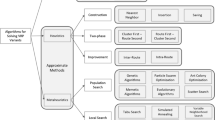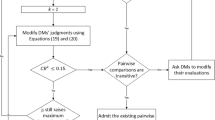Abstract
Transportation problems (TP) can be solved by various methods when the parameters are in crisp nature. But when the parameters are vague in nature or have imperfect knowledge or have partial information then we have to use the fuzzy optimization. Sujatha et al. [Solving fuzzy transportation problem (FTP) using zero point maximum allocation method] proposed the procedure for fuzzy transportation problem (FTP) with parameters are in the form of trapezoidal fuzzy numbers. But fuzzy logic is not adequate to describe all the characteristics of the system. To describe all the properties of the system, we have to consider the membership as well as the non-membership including the hesitation part. In the present research paper, we have proposed the solution of the transportation problem (TP) in the form of intuitionistic fuzzy logic by using zero point maximum allocation method. By using this technique, we can observe that the method applied to solve the fuzzy transportation problem (FTP) gives the most suitable optimal solution. A numerical example has also been given to elaborate this technique to solve the intuitionistic fuzzy transportation problem (IFTP).
Similar content being viewed by others
References
Hitchcock, F.L.: The distribution of product from several sources to numerous localities. MIT J. Math. Phys. 20, 224–230 (1941)
Zadeh, L.A.: Fuzzy sets. Inf. Control 8, 338–353 (1965)
Bellman, R., Zadeh, L.A.: Decision making in fuzzy environment. Manag. Sci. 17(B), 141–164 (1970)
Zadeh, L.A.: The concept of a linguistic variable and its application to approximate reasoning. Inf. Sci. 8(3), 199–249 (1975)
Zimmermann, H.J.: Fuzzy programming and linear programming with several objective functions. Fuzzy Sets Syst. 1, 45–55 (1978)
Oheigeartaigh, M.: A fuzzy transportation algorithm. Fuzzy Sets Syst. 8, 235–243 (1982)
Atanassov, K.T.: Intuitionistic fuzzy sets. Fuzzy Sets Syst. 20(1), 87–96 (1986)
Chiang, J.: The optimal solution of the transportation problem with fuzzy demand and fuzzy product. J. Inf. Sci. Eng. 21, 451–493 (2005)
Pandian, P., Natarajan, G.: A new algorithm for finding a fuzzy optimal solution for fuzzy transportation problems. Appl. Math. Sci. 4, 79–90 (2010)
Pandian, P., Natarajan, G.: An appropriate method for real life fuzzy transportation problems. Int. J. Inf. Sci. Appl. 3(2), 127–134 (2011)
Gani, A.N., Abbas, S.: Solving intuitionistic fuzzy transportation problem using zero suffix algorithm. Int. J. Math. Sci. Eng. Appl. 6(3), 73–82 (2012)
Rai, D., Subramanian, N., Mishra, V.N.: The generalised difference of $\int\chi^{2\textit{I}}$ of fuzzy real number over $p$-metric spaces defined by Musielak Orlicz function. New Trend Math. Sci. 4(3), 296–306 (2016)
Gani, A.N., Abbas, S.: A new method on solving Intuitionistic fuzzy transportation problem. Ann Pure Appl Math 15(2), 163–171 (2017)
Sujatha, L., Vinothini, P., Jothilakshmi, R.: Solving fuzzy transportation problem using zero point maximum allocation method. Int. J. Curr. Adv. Res 7, 173–178 (2018)
Vandana, D., Subramanian, M., Mishra, V.N.: The intuitionistic triple $\chi$ of fuzzy real number over $p$-metric spaces defined by Musielak Orlicz function. Asia Pac J. Math. 5(1), 1–13 (2018)
Vandana, D.R., Deepmala, M.L.N., Mishra, V.N.: Duality relations for a class of a Multiobjective fractional programming problem involving support functions. Am. J. Oper. Res. 8(4), 294–311 (2018)
Dubey, R., Mishra, V.N., Ali, R.: Duality for unified higher-order minimax fractional programming with support function under type-I assumptions. Mathematics 7(11), 1034–1045 (2019). https://doi.org/10.3390/math7111034
Dubey, R., Deepmala, A., Mishra, V.N.: Higher-order symmetric duality in non-differentiable Multiobjective fractional programming problem over cone constraints. Stat. Optim. Inf. Comput. 8, 187–205 (2020). https://doi.org/10.19139/soic-2310-5070-601
Acknowledgements
The first author would like to thank to Council of Scientific and Industrial Research, India for financial support and the authors are also thankful to the referees for their valuable comments.
Author information
Authors and Affiliations
Corresponding author
Additional information
Publisher's Note
Springer Nature remains neutral with regard to jurisdictional claims in published maps and institutional affiliations.
Rights and permissions
About this article
Cite this article
Kamini, Sharma, M.K. Zero-Point Maximum Allocation Method for Solving Intuitionistic Fuzzy Transportation problem. Int. J. Appl. Comput. Math 6, 115 (2020). https://doi.org/10.1007/s40819-020-00867-6
Published:
DOI: https://doi.org/10.1007/s40819-020-00867-6
Keywords
- Fuzzy transportation problem (FTP)
- Intuitionistic fuzzy transportation problem (IFTP)
- Triangular intuitionistic fuzzy number (TIFN)
- Zero-point allocation method




